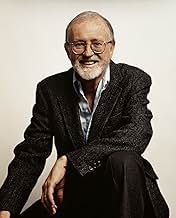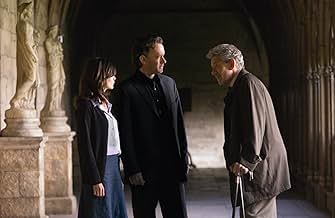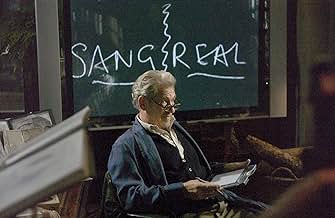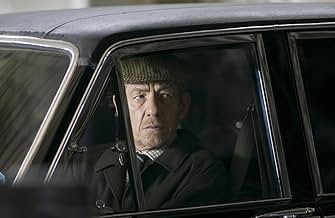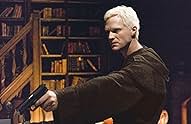Un meurtre à l'intérieur du Louvre et des indices dans des tableaux de Da Vinci ont permis de découvrir un mystère religieux protégé par une société secrète pendant deux mille ans, ce qui po... Tout lireUn meurtre à l'intérieur du Louvre et des indices dans des tableaux de Da Vinci ont permis de découvrir un mystère religieux protégé par une société secrète pendant deux mille ans, ce qui pourrait ébranler les fondements du christianisme.Un meurtre à l'intérieur du Louvre et des indices dans des tableaux de Da Vinci ont permis de découvrir un mystère religieux protégé par une société secrète pendant deux mille ans, ce qui pourrait ébranler les fondements du christianisme.
- Réalisation
- Scénario
- Casting principal
- Récompenses
- 8 victoires et 21 nominations au total
- Docent
- (as Andrew Clark)
Avis à la une
As a work of history, the novel is a passel of nonsense, and only those with a bent towards conspiracy theory overload would be foolish enough to believe a minute of it. But as a work of imaginative fiction, "The Da Vinci Code" certainly gives its audience the neck-twisting workout they've paid good money to receive.
It would be pointless to reiterate the plot of a novel that has probably had the biggest readership of any literary work since "Gone With the Wind." Suffice it to say that a mysterious murder in the Louvre sends a Harvard symbologist and the dead man's granddaughter on a clue-driven search for the famed Holy Grail. Along the way, the two uncover a grand conspiracy on the part of a renegade Catholic order to protect a secret that, if it were revealed, could shake the whole of Western civilization down to its very foundations.
Despite the phenomenal - one is tempted to say "unprecedented" - commercial success of his work, Dan Brown is no great shakes as a writer; his characters are, almost without exception, drab and two-dimensional, and his dialogue, when it isn't being overly explicit in pouring out explanations, sounds like it was written by a first-year student in a Writer's 101 workshop. But the one undeniable talent Brown does have is his ability to knit together a preposterously complex web of codes and clues into an airtight tapestry, and to make it all convincing.
The movie is very faithful to the novel in this respect. It moves quickly from location to location, never giving us too much time to question the logic (or illogic) of the narrative or to examine the many gaping plot holes in any great detail. Writer Akiva Goldsman has encountered his greatest trouble in the scenes in which the action stops dead in its tracks so that the characters can lay out in laborious detail the elaborate story behind the clues. Yet, this is as much the fault of the nature and design of the novel as it is of the man given the unenviable task of bringing it to the screen. Moreover, perhaps in the interest of time and keeping the action flowing, Robert and Sophie come up with solutions to the myriad riddles much too quickly and accurately, with a "Golly, gee, could it mean_______?" attitude that borders on the ludicrous. But, somehow, Howard makes most of it work. Perhaps, it's the clunky literal-minded earnestness with which he approaches the subject that ultimately allows us to buy into it against our better judgment.
Tom Hanks is stolid and passive as Dr. Robert Langdon, the college professor involuntarily driven into all this cloak-and-dagger intrigue, but Audrey Tautou has a certain subtle charm as Sophie, the woman who may play more of a part in the unraveling of the mystery than even she herself can imagine. Jean Reno and Paul Bettany have their moments as two of the less savory players in the story, but it is Ian McKellen as Sir Leigh Teabing, an expert on all things related to the Holy Grail, who walks off with the film. His scenery-chewing shtick pumps some much needed life into a tale essentially populated by underdeveloped stick figures.
The religious controversy surrounding both the novel and the film is as ludicrous as it is unjustified. Anyone whose belief system could be seriously shaken by this absurd mixture of unsubstantiated myth-making and plain old-fashioned wild speculation couldn't have had a very solid foundation of faith to begin with.
The rest of us can appreciate "The Da Vinci Code" for what it is, an overblown but epic exercise in code-busting and clue-decoding - in short, the "Gone With the Wind" of whodunits.
First, I have to qualify myself. I read the book and I LOVED it; couldn't put it down. I loved the history, the speculation, the riddles and puzzles, and the masterful blend of fact and fiction. Additionally, I'm not religious, although I was definitely familiar with Christian historical icons such as Jesus, John the Baptist, and Mary Magdelene before I read the book. I also happen to be a big fan of Tom Hanks, Ron Howard, and Ian McKellan.
Having said that, I went in prepared to like this movie, even though I had somewhat lowered my expectations based on the barrage of bad reviews. All of this proved to be a winning formula for me, apparently.
If you're like me and you loved the book and you like the artistic team that pursued making it into a movie, then you'll most likely come out satisfied. You won't mind what many critics have called "overly-long exposition" and historical flashbacks, because that's pretty much what the book consisted of. And in the book, it was absolutely engrossing! So, I personally didn't mind all of the explanation of history, symbols, etc.
Critics have also found fault with Tom Hanks and Audrey Tatou's portrayals of Robert Langdon and Sophie Neveu (respectively), saying that they delivered flat performances. But once again, whoever read the book will remember that both of these characters weren't that dynamic on the written page, either. Of course, Sir Ian McKellan, with the juiciest role of Holy Grail scholar Sir Leigh Teabing, chews up the scenery every time he's shown on screen. Sir Leigh Teabing was also one of the richest characters in the book.
I think that the people who won't like this movie are people who didn't read the book, and are going into the theater expecting a regular movie, which it's not. It's an adaptation of a very wordy, detailed, twisting, speculative novel that blends fact and fiction in a devastatingly effective way, and it's easy to get lost while watching the movie if you don't already know where the story is going. Sure, Ron Howard uses digitized, grainy flashbacks of ancient pagan rituals and societies to move the narrative along and to keep the audience on point, but I can see how it could be overwhelming to those who only know the bare bones of the plot. However, those who found it fascinating in the book will find pleasure in seeing the visual accompaniment to what they've already read.
In short, you go see this movie (or read the book) for how it challenges popularly-held beliefs; not for its rich, engaging character development. It's a quest for the "truth", and in terms of the IDEAS expressed, they did a dag-blasted good job of translating those ideas onto the screen. Those who often complain that movies don't stay true to the books that they're based on will find comfort in the fact that Akiva Goldsman and Ron Howard have stayed incredibly close to the original text when translating it onto the screen. However, this will be to the dismay of those movie-goers who haven't read the book, and are therefore expecting a traditional action thriller with traditional action thriller dialogue.
If you go to RottenTomatoes.com, you'll see the huge disparity between what the critics have said, and what the users have said regarding this film. While the cumulative critics rating is a dismal 22%, the combined user rating is a 74%, which is way above average for the site. That should speak volumes to whoever is skeptical about seeing the movie because of the bad reviews.
The bottom line is that it's definitely a movie worth watching if only to see how the creative team behind it went about turning the best-selling novel into celluloid. It's also a treat to see something in popular culture challenge popular religious ideals so skillfully, even if only in the form of fiction.
My advice: go see for yourself.
I have not read the book so I will not attempt any kind of comparison.
Plot essentially goes like this: In the middle of the night, Professor Robert Langdon (Tom Hanks) is summoned as an expert to a crime scene in Le Louvre where a terrible murder has been committed. The victim's body is self-placed in such a bizarre, symbolic way next to one of the world's most famous paintings that the investigation gradually unlocks age-old mysteries that many do not wish to be unlocked.
The Da Vinci Code is a chilling, thrilling and well-sewn together mystery thriller that often keeps you on the edge of your seat. The cast do not disappoint either. Paul Bettany is genuinely creepy as Silas and thereby reinforces the stereotype that all albinos are evil. While Audrey Tatou is annoyingly frail as Sophie Neveu, she is captivating and lovely and is able to project both charisma and presence on screen in this film. However, Tom Hanks did not at all feel like the protagonist in the story and I am unaware whether that was intentional or not but I'm guessing no, in which case Hanks definitely fails in both attracting and keeping our interest.
So the cast usually perform well (with the exception of Hanks) and the story is also facilitated by some very striking visuals. A big plus for this film which elevates it slightly above generic formula is its beautiful locations often seen through epic aerial shots. Good call, Howard! Another big plus is its distinctly Euro-centric feel in both style and substance. This surprised me since it is Tom Hanks and Ron Howard in the same film, but they do manage to keep the overblown Hollywood clichés to a minimum. This is even apparent in the score by Hans Zimmer; it is not overblown, but subtle and appropriate in the scenes to which it was scored. Similarly, Frenchmen do not speak English with a French accent when they were alone together, but speak in French. That said, the plot does unfold in a somewhat Hollywood fashion -- and the plot happens to be thinner than an Olsen twin.
To counter the good parts, two big minuses in The Da Vinci Code are its wooden and sometimes even placeholder dialogue and its distinct lack of humor. I felt the actors were much too serious for this kind of film, which is first and foremost an adventure story, fast-paced and constantly unlocking new mysteries. The issues in the film were serious enough and needed more comedy to balance them.
As I write this review, more and more bad points about it spring to mind. This is strange, since I remember sitting in the cinema with my friends just a few hours ago and being thoroughly entertained and captivated by the whole thing. So, never mind the occasionally insultingly far-fetched plot and plot-twists by Dan Brown; The Da Vinci Code is a nicely done and very entertaining film in which nothing feels missing or incomplete.
7/10
However, years later around three years ago I caught it for the first time on basic cable, and I honestly didn't see what all the criticism was for. Not only was it immersive and intriguing, for the most part, but it had a pretty powerful ending and reveal at the end. It isn't great, so maybe the hype was what triggered so many negative reviews, but it also isn't bad.
I never read the whole book, but understood the premise. If you really want to enjoy this film, you probably should set the book aside and set beside any offense you may take as to the religious conjecture, and just view it as a mystery movie in and of itself. I really enjoyed the ending- the whole final fifteen minutes or so.
7.8/10
Le saviez-vous
- AnecdotesAudrey Tautou revealed that, during her audition, she asked if she could take a photo of Ron Howard and Tom Hanks to prove that she'd actually met them.
- GaffesThere was no need to know the capsule's combination in order to open it as vinegar is easily frozen in a household freezer. Simply freeze the capsule and then smash it open to reveal the internal message.
- Citations
Robert Langdon: You say you hate history. Nobody hates history. They hate their own histories.
Sophie Neveu: So now you're a psychologist too?
- Crédits fousThe "A" and "V" in the film title are replaced with the "Blade" and the "Chalice" symbols described by Langdon in the movie.
- Versions alternativesThe film was originally shown to the UK censors in an unfinished form, with a temp score and sound mix. The BBFC advised Sony Pictures that sound levels during some acts of violence may be too impactful for the requested "12A" rating, so the film was likely to receive a 15 classification. When formally submitted, the final levels of sound effects on the completed soundtrack had reduced the strength of some acts of violence to an extent which made the film able to get a "12A" rating.
- ConnexionsFeatured in The Amazing Race: Herculean Effort for Some Herculean Dudes (2006)
Meilleurs choix
Détails
- Date de sortie
- Pays d’origine
- Sites officiels
- Langues
- Aussi connu sous le nom de
- El código Da Vinci
- Lieux de tournage
- Sociétés de production
- Voir plus de crédits d'entreprise sur IMDbPro
Box-office
- Budget
- 125 000 000 $US (estimé)
- Montant brut aux États-Unis et au Canada
- 217 536 138 $US
- Week-end de sortie aux États-Unis et au Canada
- 77 073 388 $US
- 21 mai 2006
- Montant brut mondial
- 760 200 455 $US
- Durée
- 2h 29min(149 min)
- Couleur
- Mixage
- Rapport de forme
- 2.39 : 1







